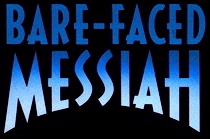
Introduction
By Chris Owen - co@nvg.unit.no

Truth, fiction and L. Ron Hubbard
"What is true is what is true for you."- L. Ron Hubbard


There are two wildly conflicting versions of the life story of L. Ron Hubbard, the founder of the Church of Scientology, The first, promoted by the Church, is that he was an unfailingly honest, generous humanitarian whose profound insights have transformed the world. The second, propounded in its fullest form in Bare-Faced Messiah by Russell Miller, is that he was a pathological liar, a fraud consumed by greed and paranoia who sucked literally millions of people into an extraordinary fantasy world.
The quotation above is one was one of Hubbard's favourite aphorisms, highlighting his claim that subjective truth is all that matters. If that's correct, then either account is equally plausible. But if objective truth is at all important, relying on evidence and reason rather than pure belief, then Bare-Faced Messiah is considerably more convincing. I have provided links between Miller's account of Hubbard's life and that of the Church of Scientology (on their Web site, www.lronhubbard.org). Compare and contrast the two biographies, look at the supporting evidence and then decide for yourself.
Why is the biography of L. Ron Hubbard important in the first place? The obvious reason is that it calls into question the whole validity of Scientology. Some Scientologists have acknowledged privately that Hubbard's official biography may be inaccurate, but that it doesn't invalidate his work. That may be so, but for those who take this view, consider this point: as a great deal of the inaccuracies in his biography originate with the man himself, what else was he inaccurate about? If Hubbard lied about his life, what else did he lie about?
This argument is, incidentally, not one that is lost on the leadership of the Church of Scientology; Russell Miller faced considerable harassment and legal action from the Church before it was possible to publish Bare-Faced Messiah. The court which permitted him to do so in Britain pointed out, quite correctly, that Hubbard was a figure of considerable public interest whose reputation was used by the Church to promote itself - and that a biography of his life was therefore prima facie in the public interest.
Bare-Faced Messiah is out of print now, but this argument remains no less strong. That is why I have reproduced the book on the Web, with Mr Miller's permission; not because I have any desire to damage the Church of Scientology but because I believe strongly that it is in the public interest to make his well-researched book available to a wider audience. Here for the first time, then, is an electronic version of Bare-Faced Messiah.

